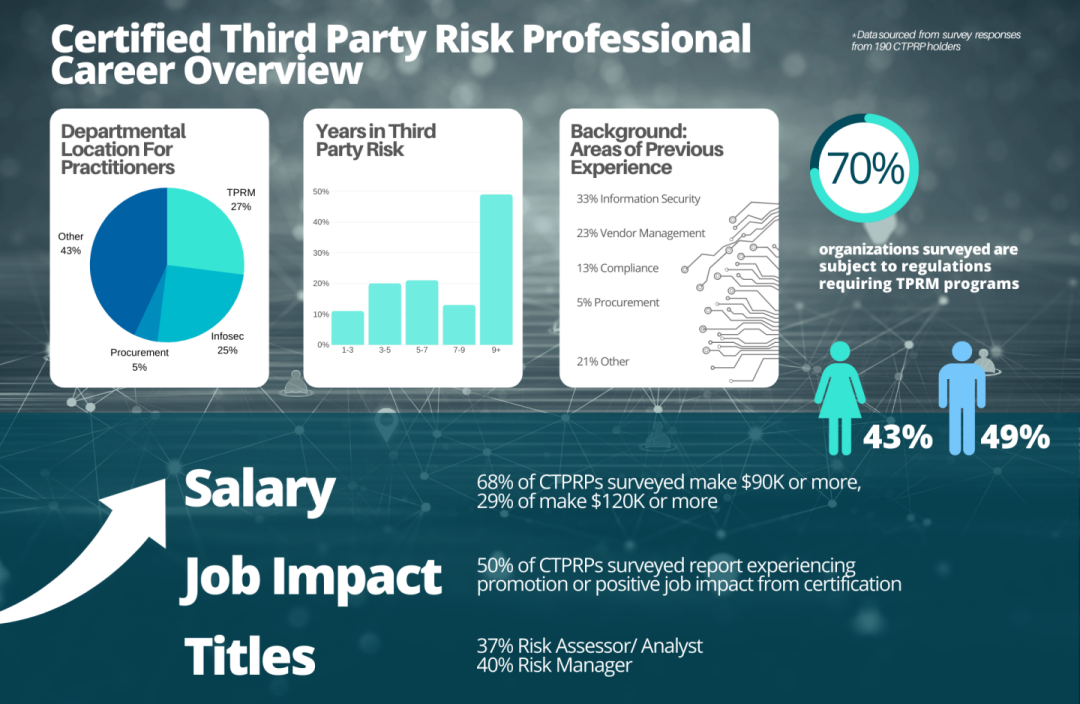This is Your Career on CTPRP …. Any Questions?

In the late ‘80s, the Partnership for a Drug-Free America ran an advertising campaign with a simple and powerful message. In one of the televised spots, a man cracks an egg (your brain) into a hot skillet (drugs) where it sizzles (your brain on drugs).
If we created a public service announcement for the Shared Assessment Program’s Certified Third Party Risk Professional (CTPRP) designation, it would have a similarly powerful and straightforward hook – and a decidedly more uplifting message. As we’ve conducted interviews this year with individuals who have earned the CTPRP certification, we’ve discovered that the experience has significantly elevated their careers, expanded their professional networks and, in some cases, burnished their reputations as thought leaders.
In the spring, I wrote about the ways CTPRPs applied their third party risk management expertise and credentials to benefit their organizations. We’ve been conducting another round of CTPRP discussions this fall, and our subjects include executives and managers who work in industry as well as for third party risk assessment firms and software companies that license the Shared Assessments Third Party Risk Management Toolkit (i.e., the Standardized Information Gathering (SIG) questionnaire tools, the Standardized Control Assessment (SCA) procedure tools for onsite assessments, the Vendor Risk Management Maturity Model (VRMMM) benchmark tools and the Privacy Tools).
These interviews have been insightful as well as enjoyable. And I want to share what we’ve been hearing from our interview subjects when they discuss how earning and maintaining their CTPRP certifications has help them on a more personal level. According to the testimonies of real-world CTPRPs, here are five sizzling career-improvement benefits you can expect to experience after getting on the CTPRP designation:
- You will become a sought-after third party risk expert within your organization. “Whenever colleagues ask questions related to third party risks, our business leaders tell them to seek out my opinion,” a cyber security and IT risk senior manager with an assessment firm. “It has helped solidify my credibility in the firm as well as externally.”
- You will be able to strengthen your leadership credentials. The CEO of a vendor with dozens of large financial services and healthcare industry client companies notes that her CTPRP designation is important in sectors that place a high value on professional certifications. “It conveys [our] commitment to privacy and security issues,” she asserts while pointing out that her decision to earn the designation also sets the right tone at the top inside her company. “I felt it was important for me to go through the certification process before I asked anybody in our organization to do it as well,” she adds.
- You will have more opportunities to speak and write. After earning his CTRPRP designation, a third party risk manager who specializes in information security received an invitation to speak at an event. He now presents regularly on third party risk topics at information security conferences. A risk manager who was part of the first group of professional to obtain their CTPRP has helped plan and draft two third party risk management white papers per year since earning his designation in 2015.
- Your network will get larger and smarter. A security compliance specialist extols the benefits of attending the past seven Shared Assessments annual summits where he sits in on workshops and taps his network of third party risk management experts. By attending these events, he’s met people “who I can go to with a question or a problem that I’m not 100 percent sure how to address,” he explains. “That issue could relate to documenting a policy for responding to customer assessments or adjusting the framework for contract reviews. I know people who are specialists in those areas from the relationships we’ve developed while working on Shared Assessments committees together. Being able to reach out to them is priceless.”
- You may become an integral part of your business development colleagues’ sales pitch. “To this day,” says a risk specialist with an assessment firm, “when my sales colleagues mention that we’re a Shared Assessments Assessment Firm member – boom, it automatically sparks a new conversation.”
You also may get promoted. A third party risk manager who specializes in incident response credits his application of CTPRP knowledge throughout his organization with helping to elevate him from senior analyst to director.
Check the current schedule to earn your CTPRP.
If you are a CTPRP holder, and want to speak about how this has helped your career or third party risk program, please contact Laura.

